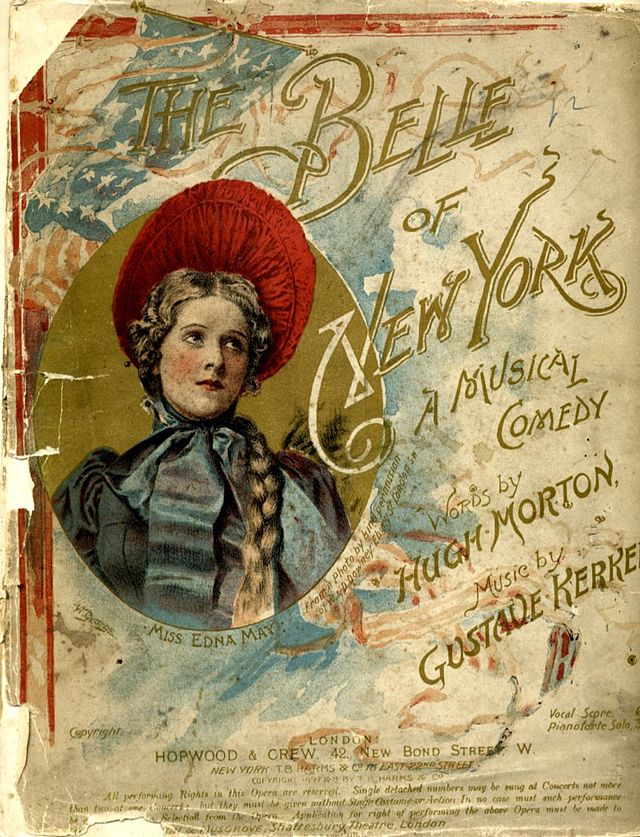Kevin Clarke
Operetta Research Center
8 June, 2013
It’s good to know that German operetta aficionados are busy rediscovering gems from the vaults of the genre’s history. And, even better, that they are not just looking at forgotten German language titles, but also at Broadway shows.

German-born Broadway composer Gustave Kerker.
One of the more fascinating discoveries that Burkhard Schmilgun made, the head of Germany’s record label cpo, is the music of Gustave Kerker (1857-1923). Most people will know Kerker as the composer of The Belle of New York, one of the most famed Broadway scores of all time, and one of those shows which are surprisingly not available as a full recording.
Kerker was born in Herford, Germany, which is why Mr. Schmilgun got interested in him. His family emigrated to the U.S. in 1867, settling in Kentucky. Kerker played in pit orchestras at local theatres and then began to conduct. His early operetta, Cadets, toured the South in 1879. Kerker then moved to New York, where he was engaged as the principal conductor at the Casino Theatre. There, he began to add his own songs into the scores of foreign operettas, notably Charles Lecocq’s The Pearl of Pekin.
Kerker’s first complete operetta in New York was Castles in the Air in 1890. He wrote over twenty shows, the most successful of which were the London musical burlesque Little Christopher Columbus (1893), and the international musical hit The Belle of New York (1897). Other notable musicals included An American Beauty (1896), The Girl from Up There (1901), Winsome Winnie (1903), The Tourists (1906), and Fascinating Flora (1907).

Kerker’s most successful show, “The Belle of New York”.
Because he was such a star of Broadway, theatre directors in Europe took note of him, too. When Berlin’s Metropol Theater – the centre of revue spectacles in Germany – wanted to present their cosmopolitan audiences with an especially international highlight, demonstrating the worldliness of their venue, they commissioned Kerker with an original German language show for Berlin. The result was an “Amerikanische Tanzoperette in drei Akten” (an American dance operetta in three acts) in 1909 entitled Die oberen Zehntausend. A grotesque society farce about the super rich and their amorous (and financial) problems.
Mr. Schmilgun managed to get this show staged, as a concert version, by the NDR Radiophilharmonie. The resulting highlights from that concert then found their way onto a cpo CD.
In principal, it’s wonderful to have the Kerker music for this show available on disc. Even if the cast doesn’t come across particularly fresh, acoustically speaking. They are all traditional German operetta singers, yet the style required is more burlesque and mad-cap, and certainly more “Broadway.”
As a result, the typical US-American flair of numbers like “Kuss Duett” or “Modernes Leben” doesn’t really work its magic. Instead of the Big White Way it sounds more like German provinces. And rather grey and smallish. If that doesn’t bother you, and you’re simply happy to have a chance to hear rare Kerker, then this disc is definitely a must-have.
On disc 2 of this release, there is Kerker’s “Very Grand Opera” Burning to Sing, or Singing to Burn (1904). It’s a hilarious opera spoof, about a crazy prima donna who refuses to leave her hotel room even though the hotel is on fire and the fire brigade needs to get in. It’s The Marx Brothers, with music. Again, the German singers are as far removed from anything you might consider slapstick or burlesque. Which seriously limits the fun of listening to this interesting musical farce.
For me, personally, the most refreshing track on this double disc, was the orchestral arrangement by Charles Godfrey Jr. of The Belle of New York, played by orchestra only under the direction of Howard Griffith.
Perhaps, one day, New York’s Encores! series will devote themselves to Kerker as a forgotten Broadway composer, and give him a more “American” treatment?
Of course, the place for Die oberen Zehntausend to be staged would be Berlin’s Komische Oper, which is the actually former Metropol Theater. But they have so many rediscoveries of their own on their list, that Kerker might have to wait a little. In the meantime, you can enjoy this cpo double disc. And dream on. For example of another disc with The Belle of New York music, complete.
By the way, the booklet of the cpo release contains a major essay on Kerker by Uwe Schneider, former head dramaturg of the Staatsoperette Dresden. That essay alone makes the purchase of the CD a “must” for anyone seriously interested in operetta.

Thank you that was wonderful to read. And yes that’s my great Uncle